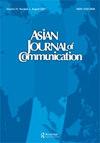The effect of dialogic competencies in internal communication and D&I-oriented leadership on relational outcomes with minority employees: focusing on the perspectives of Asian employees
IF 1.5
2区 文学
Q2 COMMUNICATION
引用次数: 1
Abstract
ABSTRACT This study focused on the experiences and perceptions of Asian employees and attempted to provide insights into effective internal communication and leadership styles related to organizational diversity and inclusion (D&I) efforts. More specifically, this study examined how the dialogic competencies of internal communication (i.e. mutuality, openness) and a D&I-oriented leadership style influence the formation of a D&I-supportive climate in the workplace and consequently strengthen the quality organization-Asian employee relationship. The study also considered the perceived authenticity and experiences of COVID-19 anti-Asian racism as key factors. Online survey results showed that dialogic competencies play a decisive role in influencing the workplace climate and, in turn, reinforcing trust, satisfaction, commitment, and control mutuality among Asian employees in their organizations. Perceived authenticity, influenced by mutuality and openness, directly or indirectly influences relational outcomes through the workplace climate. Asian employees who had experienced relatively severe COVID-19 anti-Asian racism placed more importance on the role of dialogic competencies in D&I internal communication. D&I-oriented leadership had a limited and conditional effect on fostering a workplace climate that supported D&I but not on perceived authenticity. Theoretical and practical implications were discussed.内部沟通中的对话能力和d&i导向领导对少数族裔员工关系结果的影响:聚焦于亚洲员工的视角
摘要本研究关注亚洲员工的经历和看法,并试图深入了解与组织多样性和包容性(D&I)努力相关的有效内部沟通和领导风格。更具体地说,本研究考察了内部沟通的对话能力(即相互性、开放性)和以D&i为导向的领导风格如何影响工作场所支持D&i的氛围的形成,从而加强高质量的组织-亚洲员工关系。该研究还认为新冠肺炎反亚裔种族主义的真实性和经历是关键因素。在线调查结果显示,对话能力在影响工作场所氛围方面发挥着决定性作用,进而增强了亚洲员工在组织中的信任、满意度、承诺和控制力。受相互性和开放性影响的感知真实性,通过工作环境直接或间接影响关系结果。经历过相对严重的新冠肺炎反亚裔种族主义的亚洲员工更重视对话能力在D&I内部沟通中的作用。以D&I为导向的领导力对培养支持D&I但不影响感知真实性的工作环境具有有限和有条件的影响。讨论了理论和实践意义。
本文章由计算机程序翻译,如有差异,请以英文原文为准。
求助全文
约1分钟内获得全文
求助全文
来源期刊

Asian Journal of Communication
COMMUNICATION-
CiteScore
3.70
自引率
0.00%
发文量
38
期刊介绍:
Launched in 1990, Asian Journal of Communication (AJC) is a refereed international publication that provides a venue for high-quality communication scholarship with an Asian focus and perspectives from the region. We aim to highlight research on the systems and processes of communication in the Asia-Pacific region and among Asian communities around the world to a wide international audience. It publishes articles that report empirical studies, develop communication theory, and enhance research methodology. AJC is accepted by and listed in the Social Science Citation Index (SSCI) published by Clarivate Analytics. The journal is housed editorially at the Wee Kim Wee School of Communication and Information at Nanyang Technological University in Singapore, jointly with the Asian Media Information and Communication Centre (AMIC).
 求助内容:
求助内容: 应助结果提醒方式:
应助结果提醒方式:


